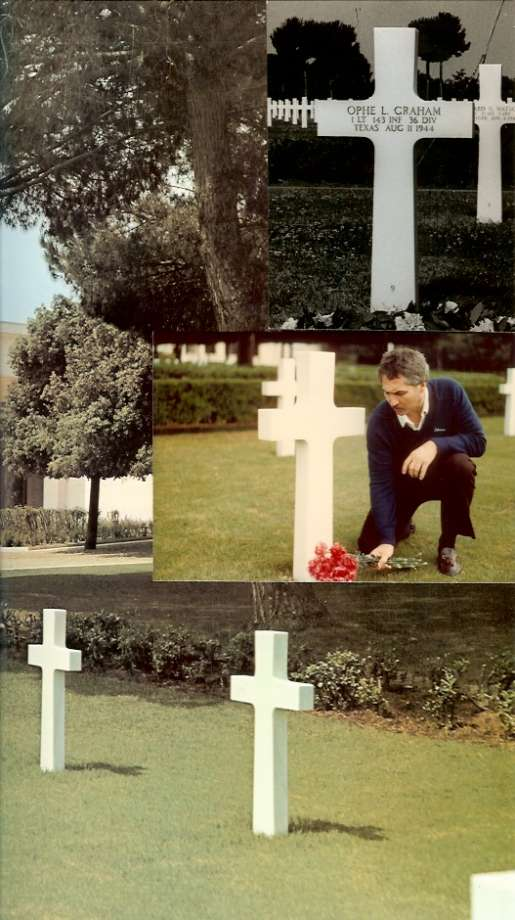By BOB VICKREY–
(Editor’s note: Bob Vickrey shared a story with Circling the News that was originally published in 2012 for the Houston Chronicle. “This is a story about my boyhood friend Geren Graham, who traveled 5,700 miles from Houston to an Italian coastal town near Anzio to pay his respects to First Lt. Ophe Lee Graham, the father he had never met. I thought today might offer an opportunity to share his extraordinary story once again,” Vickrey wrote on Memorial Day.)
A tall, handsome American man knelt in the misting rain with his head bowed in front of a small marble cross in an immense field of grave sites arranged on vast acres of manicured grounds.
He had come to the only spot on earth that might offer a long-sought resolution in his attempt to make peace with the father he had never known.
Rows of pines and majestic olive trees on the outer edges of the city of Nettuno, Italy, added to the stately setting. A huge American flag waved in the gentle breeze on this land that had been given in perpetuity to the United States.
Engraved on the crosses there are the names of 7,861 American soldiers who had lost their lives on several Italian World War II battlefields. One of the crosses there was in honor of 1st Lt. Ophe Lee Graham of the 143rd Infantry, who had never returned home after losing his life at Salerno in August of 1944.
Geren Graham had traveled 5,700 miles from Houston to the western Italian coastal town near Anzio some 40 years later to meet his father for the first time in his life.
Three years before his deployment to the European front, Ophe Lee had married his sweetheart, Burna Dean. She was a stunning beauty with mesmerizing dark features. However, a world war on a distant continent far away from home would require his services, even though it meant leaving his young wife who was expecting their first child.
His death rocked the small community of Galena Park on the eastern outskirts of Houston, where he had been a shining star in high school. His parents and family lived within a few blocks of one another in this tight-knit industrial town.
Geren was only six months old when the news of his father’s death reached his family back home.
His mother struggled to deal with the loss of a husband and the father of her infant son. Ophe Lee’s loving parents and his three brothers, each of whom had only recently returned from war, saw to it that Burna Dean and her baby were taken care of. The extended family offered its support, which helped immensely in the healing process during the coming years.
Ophe Lee’s younger brother, A.C., who was better known as “Junior,” was especially supportive. He and Burna Dean were married several years later and helped provide and sustain a stable home environment for the young mother and son. They eventually had three children of their own. Junior was a quiet, affable man who was well respected in the community. Perhaps more importantly, Junior was someone Geren could proudly call his dad.
Geren grew up to become a star football player at Galena Park High School. In his senior year, he led the Yellow Jacket team to its first-ever state finals championship game. He was the leading rusher and scorer that year and was also team co-captain. The following spring, he accepted a scholarship to play for Southern Methodist University.
I was a classmate of Geren during our school years. We had grown up together and been close friends since we were kids, but I had never known the whole story of his father. Decades later, he revealed the details during a visit to my Southern California home after his trip to Italy.
His wife, Judy, encouraged him to tell me the dramatic and emotional story of their visit to Italy the year before, and I’ve never forgotten the image I had envisioned of a grown son kneeling in front of his long-lost father’s grave. What surprised me about his story was that he went there not only to deal with the loss of a parent he never had the chance to meet, but in his words: “To forgive my dad for not coming home to Mom and me after the war.”
Sure enough, that long journey was indeed the healing force that helped my good friend come to terms with the emotions he had lived with his whole life. He said he felt a new-found serenity and the emergence of a kindred spirit in the presence there of his dad.
It took almost half a lifetime to find him, but Geren Graham had finally met his father that day at Nettuno. With that missing chapter having been written in his life story, he walked away knowing that his world would now seem ultimately more complete.
This Memorial Day weekend we will humbly pay homage to the American soldiers who have paid the ultimate price in the service of their country on battlefields throughout the world. The image of a grieving son on a windswept hill in a faraway land should also remind us to remember the other casualties of war – the family members who have been left with the emotional scars of war that will endure for a lifetime.
Bob Vickrey is a longtime Palisades resident whose columns appear in several Southwestern newspapers including the Houston Chronicle and the Waco Tribune-Herald. You can read more of his columns on his website: http://bobvickrey.net/



Beautiful story. Thank you.